pow wow
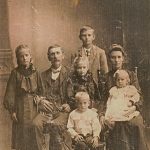
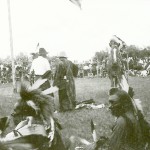 My great grandfather, Cornelius Byer was a kind and a fair man. He was generous and honest. It was these qualities that earned him the respect of the Indian tribes in the Gordon, Nebraska area. Great Grandpa passed away on October 23, 1930, but the celebration of life, really began before the day of the funeral, and even before he passed away. Over the years of his life, my great grandfather became a great friend of the Indians. He was invited to their pow wows, he was asked his opinions on things…and they listened when he spoke. He was helpful to the Indian tribes, and they, in turn treated him with great respect.
My great grandfather, Cornelius Byer was a kind and a fair man. He was generous and honest. It was these qualities that earned him the respect of the Indian tribes in the Gordon, Nebraska area. Great Grandpa passed away on October 23, 1930, but the celebration of life, really began before the day of the funeral, and even before he passed away. Over the years of his life, my great grandfather became a great friend of the Indians. He was invited to their pow wows, he was asked his opinions on things…and they listened when he spoke. He was helpful to the Indian tribes, and they, in turn treated him with great respect.
The Indians would often show up at his home…something that would most likely panic most people. Most often the women and children would stay outside, while the men went in to visit with Great Grandpa. It was another show of respect. The Indians often camped near the house when the men were visiting. I’m sure it was a very interesting lifestyle for my grandmother.
While all that was interesting, probably the most interesting thing happened as Great Grandpa was dying and after his passing. When he lay dying, the Indians came…long lines of them. Each one, including the women and 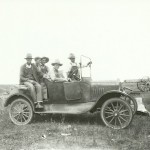
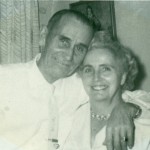 children, passed by his bed. They spoke words of respect and admiration. I’m sure it took hours, but none were turned away. Great Grandma knew how much they loved him, and how much they needed to say goodbye. I would love to have had the chance to see that scene. These were two groups of people who normally didn’t get along, and yet they showed so much love and respect for one another. There was no warring with, no stealing from, no depriving of one another. There was simply love and respect. I’m sure it made my Great Grandmother Edna (Fishburn) Byer and their children feel very safe over the years.
children, passed by his bed. They spoke words of respect and admiration. I’m sure it took hours, but none were turned away. Great Grandma knew how much they loved him, and how much they needed to say goodbye. I would love to have had the chance to see that scene. These were two groups of people who normally didn’t get along, and yet they showed so much love and respect for one another. There was no warring with, no stealing from, no depriving of one another. There was simply love and respect. I’m sure it made my Great Grandmother Edna (Fishburn) Byer and their children feel very safe over the years.
My grandfather, George Byer arrived at the homestead on October 20, 1930. My grandmother, Hattie Byer stayed home with their newborn daughter, Virginia, who was just 4 months old at the time. Grandpa brought almost 2 year old Evelyn with him. His letter at the time said that all the children were there, or soon would be. Three days later, Great Grandpa Cornelius Byer passed away. I’m so glad my grandpa got to see his dad before he passed. When it was time to have the funeral, they would have to travel into Gordon, Nebraska. We would never think of transporting our own loved one to the funeral, but those were different times. Nevertheless, the 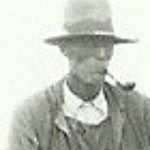
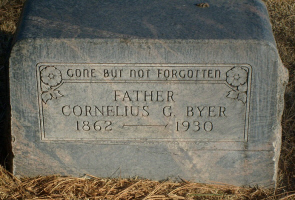 Indians would not leave their dear friend to go alone. With the casket in a wagon, and his son driving, Great Grandpa went to his funeral. Little Evelyn sat in the back of the wagon, wide-eyed in wonder as a long line of Indians followed the procession to the cemetery. In death, as in life, their respect for this man, who was my great grandfather, was on display. I can’t think of a greater honor than this. Cornelius Byer was truly loved and respected by all who knew him.
Indians would not leave their dear friend to go alone. With the casket in a wagon, and his son driving, Great Grandpa went to his funeral. Little Evelyn sat in the back of the wagon, wide-eyed in wonder as a long line of Indians followed the procession to the cemetery. In death, as in life, their respect for this man, who was my great grandfather, was on display. I can’t think of a greater honor than this. Cornelius Byer was truly loved and respected by all who knew him.
 For most of his life in the United States, my great grandfather, Cornelius Byer, was friends with the Indians. He and my grandfather, George Byer were invited to Pow Wows with the Indians, and many of them came to their home bearing gifts and just to visit. That wasn’t the normal course of events in those days, however. For many of the people that the Indians dubbed, The White Man, crossing paths with the Indians meant death. Many of the Indians were considered criminals. They were locked away in prison or, if they were lucky, the reservations. The reservations weren’t great, but they were better than prisons…I suppose.
For most of his life in the United States, my great grandfather, Cornelius Byer, was friends with the Indians. He and my grandfather, George Byer were invited to Pow Wows with the Indians, and many of them came to their home bearing gifts and just to visit. That wasn’t the normal course of events in those days, however. For many of the people that the Indians dubbed, The White Man, crossing paths with the Indians meant death. Many of the Indians were considered criminals. They were locked away in prison or, if they were lucky, the reservations. The reservations weren’t great, but they were better than prisons…I suppose.
Crazy Horse has a serious score to settle with The White Man. The government wasn’t suppose to let the settlers into the Dakotas. Then explorers went in anyway, and found gold. Of course, the government reneged on the deal, and The White Man came flooding into the Dakotas. In reality, it was going to be inevitable. A some point, the United States and her people were going to grow to a place whereby they would need more room. Eventually someone was bound to find the Dakotas, and especially one of my favorite places, The Black Hills. This was the area of the United States where the Lakota Sioux and Crazy Horse lived.
The breaking of the treaty to keep the Dakota Territory in the hands of the Lakota Sioux brought the government into a war with the Lakota Sioux and with Crazy Horse. Crazy Horse would lead the Lakota Sioux to victory in The Battle of the Little Big Horn. After that battle, Crazy Horse was a wanted man, and the cavalry would stop at nothing to find him. After the Battle of the Little Big Horn, on June 25, 1876, it was inevitable that Crazy Horse would one day have to surrender. That day came on May 6, 1877, when Crazy Horse, He Dog, Little Big Man, Iron Crow, and several others surrendered themselves to First Lieutenant William P Clark. For the next four months Crazy Horse resided in his village near the Red Cloud Agency, but Red Cloud and Spotted 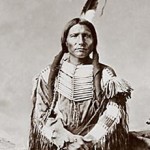 Tail became jealous of the attention the Army gave to Crazy Horse. They had adopted many of the White Man’s ways, and when they heard a rumor that Crazy Horse was planning to slip away, and go back to their old ways. Crazy Horse had actually agreed to fight on the side of the White Man, but his words were misinterpreted, and on the morning of September 4, 1877, just four months after his surrender, the Army attacked Crazy Horse’s village. Crazy Horse agreed to accompany Lieutenant Jesse Lee back to Fort Robinson, there Lieutenant Lee was told to turn him over to the Officer of the Day. He didn’t want to, but he did. As he was taken into custody, Crazy Horse struggles and was stabbed with a bayonet by one of the members of the guard. He died later that night. It was a sad case of misunderstanding, and it cost him his life.
Tail became jealous of the attention the Army gave to Crazy Horse. They had adopted many of the White Man’s ways, and when they heard a rumor that Crazy Horse was planning to slip away, and go back to their old ways. Crazy Horse had actually agreed to fight on the side of the White Man, but his words were misinterpreted, and on the morning of September 4, 1877, just four months after his surrender, the Army attacked Crazy Horse’s village. Crazy Horse agreed to accompany Lieutenant Jesse Lee back to Fort Robinson, there Lieutenant Lee was told to turn him over to the Officer of the Day. He didn’t want to, but he did. As he was taken into custody, Crazy Horse struggles and was stabbed with a bayonet by one of the members of the guard. He died later that night. It was a sad case of misunderstanding, and it cost him his life.
 My mom grew with stories about the Indians her grandfather had known in his lifetime. Of course, my Great grandpa Byer passed away before my mom was even born, but his legacy lived on long afterward. He had been a friend to the Indians, and had been invited to take part in their Pow Wows. I don’t really know how much this impressed my mom, but I know that she often talked about the stories she had heard so many times in her youth. I remember, Mom’s stories well…probably because she used to use examples of Indian things when she spoke to us in everyday life.
My mom grew with stories about the Indians her grandfather had known in his lifetime. Of course, my Great grandpa Byer passed away before my mom was even born, but his legacy lived on long afterward. He had been a friend to the Indians, and had been invited to take part in their Pow Wows. I don’t really know how much this impressed my mom, but I know that she often talked about the stories she had heard so many times in her youth. I remember, Mom’s stories well…probably because she used to use examples of Indian things when she spoke to us in everyday life.
As with most kids, we figured shoes were optional in the 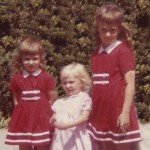 summertime, and in reality, they were in the way. As a result of this belief, our feet spent the better part of the summer looking as black as the ace of spades. My mom liked to joke with us about our feet. She would say such things as, “Look at those feet! The are completely black! Are you part of the Blackfoot Tribe!” I didn’t know much about the history of the Blackfoot Indians, but apparently they got their name because of their moccasins, which were often black from walking through the ashes of the prairie fires. Many of the Indian tribes would set the prairie on fire as a way of…well, mowing the lawn. Tall grass provides a hiding place for enemies, be they animal or human. So, burning them made riding and walking easier, and gave the protection of the open areas with no place to hide from the
summertime, and in reality, they were in the way. As a result of this belief, our feet spent the better part of the summer looking as black as the ace of spades. My mom liked to joke with us about our feet. She would say such things as, “Look at those feet! The are completely black! Are you part of the Blackfoot Tribe!” I didn’t know much about the history of the Blackfoot Indians, but apparently they got their name because of their moccasins, which were often black from walking through the ashes of the prairie fires. Many of the Indian tribes would set the prairie on fire as a way of…well, mowing the lawn. Tall grass provides a hiding place for enemies, be they animal or human. So, burning them made riding and walking easier, and gave the protection of the open areas with no place to hide from the 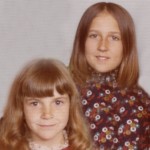 tribe’s people. It was the best protection they could have.
tribe’s people. It was the best protection they could have.
I always used to wonder why she would say that we were from the Blackfoot Tribe, and then I checked into it. No, we weren’t wandering around the prairie, walking through the ashes left from mowing the lawn, but we did wear moccasins for a time, when they were in style. The reality, however, was that she was reminded of the Blackfoot Tribe, by her own little tribe of barefoot girls with feet as black as soot, running around, carefree and happy, in the summer sun. Her own little tribe of Blackfoot Indians.
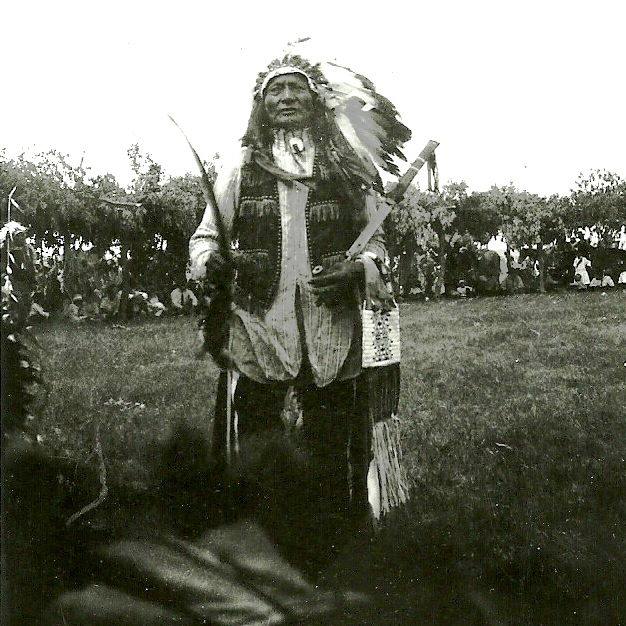
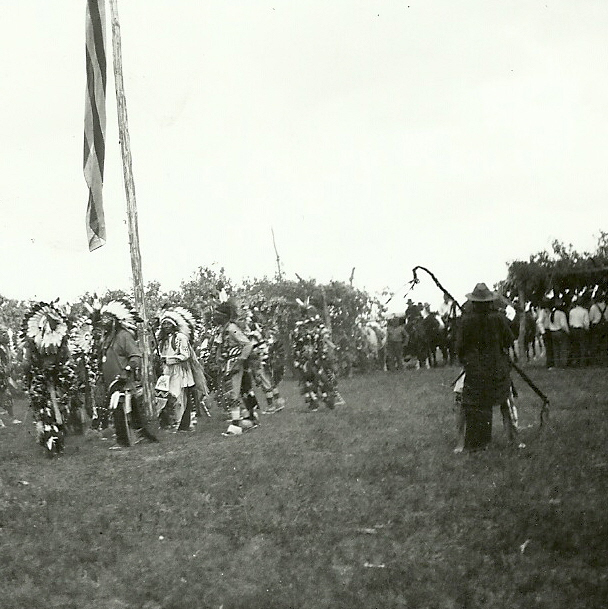 Most of us are able to trace our roots back to the Old West, since many of our ancestors were homesteaders. The Old West was a dangerous place to live. There were few, if any lawmen around, and outlaws found it to be a good hiding place. Probably a bigger concern for many of the settlers was the Indian population. There were a lot of hard feelings toward the white man, because of broken treaties and stolen lands. Still, this wasn’t really the fault of the settlers and homesteaders, but they were the ones who often suffered the consequences. For this reason, friendships between the Indians and the White Man were rare.
Most of us are able to trace our roots back to the Old West, since many of our ancestors were homesteaders. The Old West was a dangerous place to live. There were few, if any lawmen around, and outlaws found it to be a good hiding place. Probably a bigger concern for many of the settlers was the Indian population. There were a lot of hard feelings toward the white man, because of broken treaties and stolen lands. Still, this wasn’t really the fault of the settlers and homesteaders, but they were the ones who often suffered the consequences. For this reason, friendships between the Indians and the White Man were rare.
My grandfather’s family was privileged to have one of those rare relationships. They were accepted and even loved by the Indians in the area. They were invited to the Pow Wows and other celebrations. The had meals and probably hunts with the Indians, and got to know them well. They knew men like Chief Thin Elk and Sitting Bull, two Lakota Sioux Indians and their tribes. They spent time with them, and learned their customs…spoke their language. Not many White Men had the opportunity to do that.
Of course, when we think back on the Old West, the first thing that comes to mind are the old shows, like Bonanza, Gunsmoke, and Little House on the Prairie. 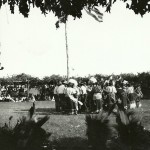
 We seldom think of the real people who lived those times…especially our own ancestors. I had been told that my great grandfather knew some Indians, but it just didn’t register until I saw pictures of him with the Indians…being friends with the Indians…having Pow Wows with the Indians. My great grandfather was one of those rare people who really did know Indians from the Old West. It was such an eye opening moment for me.
We seldom think of the real people who lived those times…especially our own ancestors. I had been told that my great grandfather knew some Indians, but it just didn’t register until I saw pictures of him with the Indians…being friends with the Indians…having Pow Wows with the Indians. My great grandfather was one of those rare people who really did know Indians from the Old West. It was such an eye opening moment for me.

